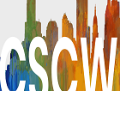The phrase "online harms" has emerged in recent years out of a growing political willingness to address the ethical and social issues associated with the use of the Internet and digital technology at large. The broad landscape that surrounds online harms gathers a multitude of disciplinary, sectoral and organizational efforts while raising myriad challenges and opportunities for the crossing entrenched boundaries. In this paper we draw lessons from a journey of co-creating a transdisciplinary knowledge infrastructure within a large research initiative animated by the online harms agenda. We begin with a reflection of the implications of mapping, taxonomizing and constructing knowledge infrastructures and a brief review of how online harm and adjacent themes have been theorized and classified in the literature to date. Grounded on our own experience of co-creating a map of online harms, we then argue that the map -- and the process of mapping -- perform three mutually constitutive functions, acting simultaneously as method, medium and provocation. We draw lessons from how an open-ended approach to mapping, despite not guaranteeing consensus, can foster productive debate and collaboration in ethically and politically fraught areas of research. We end with a call for CSCW research to surface and engage with the multiple temporalities, social lives and political sensibilities of knowledge infrastructures.
翻译:暂无翻译




